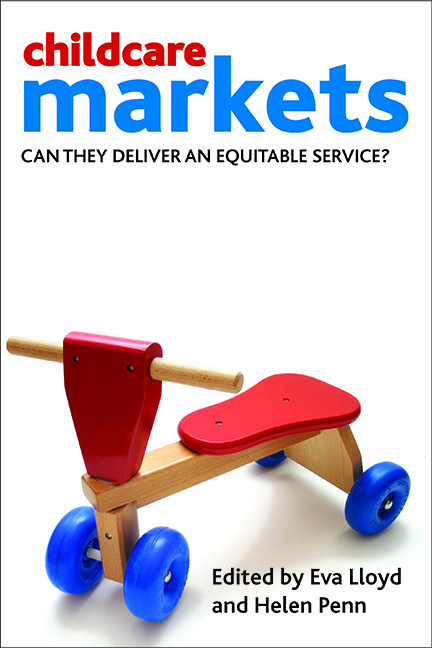eight - Childcare markets in the US: supply and demand, quality and cost, and public policy
Published online by Cambridge University Press: 01 September 2022
Summary
Introduction
The dual functions of childcare, as a service to parents to support employment and as a service to children to support child development, are sometimes in conflict in the United States’ market-based system (Edie, 2006; Prentice, 2009). This tension is seen in the manner in which services are structured by private for-profit providers and non-profit providers and in the public policies that intersect with childcare. Childcare provision and use is also tied to a larger debate in the US about the extent to which childrearing is a private good, benefiting families as private consumers, or a public good, benefiting society as a whole by nurturing the development of individuals who are more likely to be productive, self-sufficient citizens (Helburn, 1999). The dominant attitude in the US has been to consider the family as a private unit, to place high value on individual responsibility, and to limit government involvement in matters related to family (Meyers and Gornick, 2003; Brauner et al, 2004). Thus, there is no overall national child or family policy and no centralised federal oversight of children’s services (OECD, 2004). A federal Comprehensive Child Development Act passed Congress in 1971, but was then vetoed by President Nixon, who stated in his veto message that ‘the Federal Government's role wherever possible should be one of assisting parents to purchase needed daycare services in the private, open market, with Federal involvement in direct provision of such services kept to an absolute minimum’ (as quoted in Zigler et al, 2009, p 37; see also Cohen, 2001). Similarly, federal quality standards failed in 1980 after 13 years of effort (Cohen, 2001; Zigler et al, 2009). Regulatory oversight and most administration of early care and education services lie instead with the individual states. State standards vary widely but are largely considered inadequate (Zigler et al, 2009). Public funding for childcare has risen in recent years to historically high levels, but the most recent data available indicate total expenditure of US$20.4 billion on children from birth to age 5 in 2004 amounted to 0.2% of gross domestic product (GDP) compared with 3.7% of GDP on primary and secondary education in 2007 (OECD, 2004, 2007).
- Type
- Chapter
- Information
- Childcare MarketsCan They Deliver an Equitable Service?, pp. 131 - 152Publisher: Bristol University PressPrint publication year: 2012



